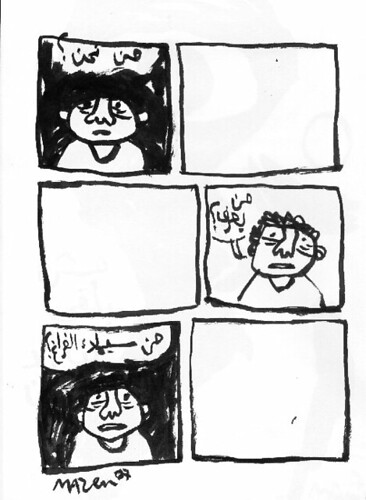What are we eating? Why are our banks flourishing? Who are those clearing cluster bombs? How will Brazil help in recycling Lebanese wastes? Where are some of the children who were caught in the crossfire? What about some music? These are some of the questions answered in this week’s selections from the Lebanese blogosphere.
Let us start with three existential questions posed by Mazen Kerbaj. In his artwork below he asks: “who are we? who knows? who will fill the blanks?”

Moving on we have Prof Rami Zurayk who begins one of his article titled “O Lebanese if only you knew what you were eating” with a letter that Antoine Howayyek, head of the Organization of Lebanese Farmers, sent to some ministers in the Lebanese cabinet asking them:
why are there no standards and no controls over the quality of the imported food products: fruits, vegetables, milk and milk products? Why does the ministry not do its job and operate or outsource the quality control at the borders?
The above mentioned letter raises many other points about trade, agriculture and local production. One of these points is:
There is no way to know the origin of products sold in the Lebanese market. Most products are imported and yet sold as originating form Lebanon. Each year, 5,000 tons of white cheese is imported and sold as Lebanese cheese. Lebanese law states that products have to be sold in their original packaging.
After discussing the content of the letter, Prof Zurayk concludes that:
Supporting local production through identifying origins may be the first step of something bigger, like food quality criteria. Imagine if we took a decision to clearly label GMO-containing foods. There goes US grain, US junk food, US soybean oil, and US confectionery. The bulk of our food import bill. Now the US masters will NOT be very happy with that, will they?
Unexploded ordnance in the form of cluster bombs, dropped by Israel on Lebanon during last year's war, is also hampering agricultural and food production in the South. Not to forget that left-over bomblets have so far injured and killed 239 people since the declaration of the cease-fire. Blogger Lebanese talks about a film that introduces some volunteers who are working on clearing the field from these cluster bomblets, in an attempt to show the stories and faces behind the statistics and numbers.
We are also introduced to Muhammed Nahle, a Lebanese Civil Defence volunteer whose leg was amputated as a result of a cluster bomb injury which took place on the last day of the war. His ability to remain optimistic in the light of such an injury is inspiring. These people are the heroes whose daily lives continue to be affected by the effects of last year's war. They are the faces and the living stories behind the statistics we hear.
The weekly report of one major Lebanese bank noted that customer deposits witnessed year-on-year growth of 4 per cent in 2005 and 6 per cent in 2006. This happened despite the political turmoil and security risks in the country. This article posted by Bech at Remarkz sheds light on this phenomenon:
I say simply that those who ‘put money’ in the Lebanese economy, of course I mean those who really do make a change, have political guarantees and are part of the same network. It seems that with regards to the banking sector (and I stress only the banking sector), there is a solid system in place. A system that involves few actors but a lot of money, unconcerned by the rest of the Lebanese economy. Because at the end of the day, it is not the Lebanese economy per se that is at the heart of concerns, but some kind of fictive ‘confidence-based’ economy created by a bleeding public financial system being eaten away by lazy local banks who if they don't put their money in fatly remunerated TBills go invest outside of Lebanon. Why would a war then destabilize this system?
Brazil is going to help Lebanon recycle its wastes, especially debris from demolished or destroyed buildings. These will be used in the construction of roads and houses according to an article posted at Tears for Lebanon.
Photos of Palestinian children, who fled from the Nahr al Bared Palestinian camp where the Lebanese Army is fighting Fath al Islam militants, are the topic of a post by Golaniya. She also posts about the Iraqi children who were found tortured and at the brink of starving to death in one of orphanages in Iraq last week.
Let’s end this week’s review with some music. Ziad El Ahmadie is a Lebanese composer, singer and oud player. His work incorporates different musical instruments and styles. Downloadable samples of his work can be found at his new blog.
That will be all for this week. Take care.






